2021 Graduate Profiles
THE 97TH ANNUAL CONVOCATION OF ST. STEPHEN'S COLLEGE
The 97th Annual Convocation of St. Stephen’s College consisted of two graduation events: a Spring graduation celebration on May 10, 2021 and a Fall convocation ceremony on November 1, 2021. The decision to accommodate student graduations in both Spring and Fall was part of the College’s response to the COVID-19 pandemic. In Summer 2020, the St. Stephen’s Faculty Council saw that the onset of the pandemic had the potential to delay many students in completing certain program milestones, which in turn would mean those same students would likely miss the convocation deadlines for Fall 2020. Rather than requiring students to wait until Fall 2021 to graduate (a full 12 months after their planned to graduation date!), the College instead decided to add a special graduation event in Spring 2021, thus alleviating some of the stress and pressure caused by the pandemic.
Master of Psychotherapy and Spirituality
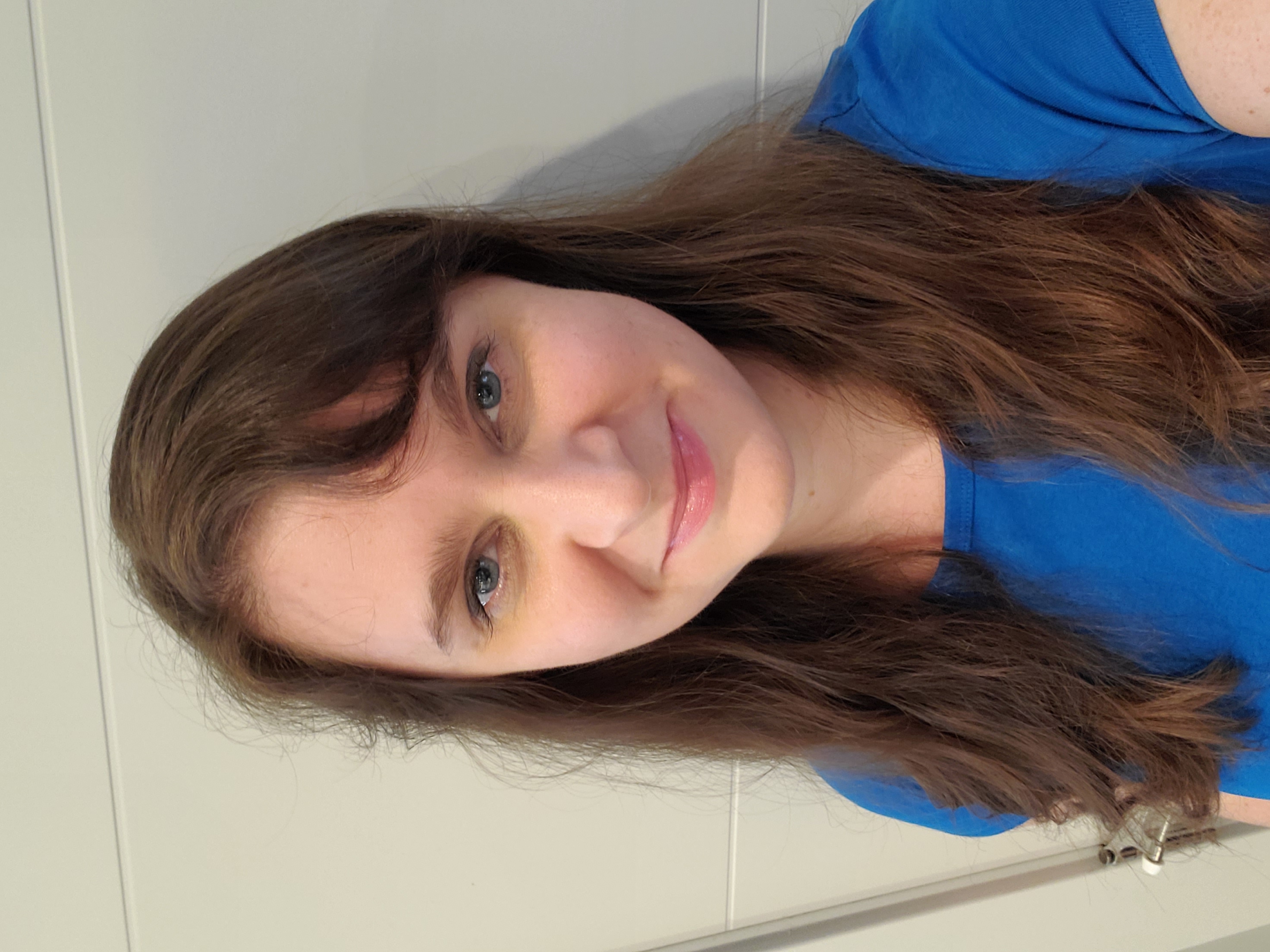 Anna Victoria Garner
Anna Victoria Garner
During times of turmoil, a person’s spirituality is tested and can become a source of strength and support. By integrating spirituality into psychotherapy, I hope to help people who have experienced traumas not just heal and survive, but also to thrive. With my completion of the MPS program at St. Stephen’s College, I am delighted move on to the next stage in my own path, helping people on their healing journeys.
Thesis Title: Posttraumatic Growth and Spirituality: The Journey to Becoming Beautiful People
Thesis Abstract: Posttraumatic growth is a phenomenon that is characterized by the significant personal changes and growth that an individual can experience after a traumatic event. This research contributes to the existing body of research on posttraumatic growth by deeply looking into the experience after trauma, gaining insight into the process of growth after trauma, and the role that a person's spirituality plays in their growth process. This research answered the question “What is the experience of growth in the aftermath of a traumatic event?” with a particular focus on how aspects of spirituality and religion affected their journey. Semi-structured interviews were given to a convenience sample of five co-researchers. This research uses the hermeneutic phenomenological method to analyze the experiences of growth after trauma. The picture of my co-researchers’ growth is consistent with existing research on posttraumatic growth. The process of growth involves a continuous journey, a series of choices, existential questioning, support, and acceptance. My co-researcher’s experience highlights the importance of their personal spirituality. Spiritual themes: suffering, openness, and meaning making, had corresponding active processes: existential questioning, acceptance, and daily application, that helped change the traumatic experience into growth. The primary implication of my research to psychotherapeutic practice and posttraumatic growth research is the role spirituality plays in the growth process. Further research should investigate how spirituality can be used as support for clients and how therapists can assist their clients in cultivating this important resource for growth.
Favourite SSC Memory: My favorite memories for St Stephen’s College all involve moments in class in which students shared their experiences, thoughts, and wisdoms: the moments in which the students supported each other in growth and learning. They were moments in which more than minds met, and I could feel the connection with the beautiful person across from me.
Future Ambitions: I would like to continue my therapeutic educations and become certified in both Gottman Method marriage therapy, and trauma-informed therapies.
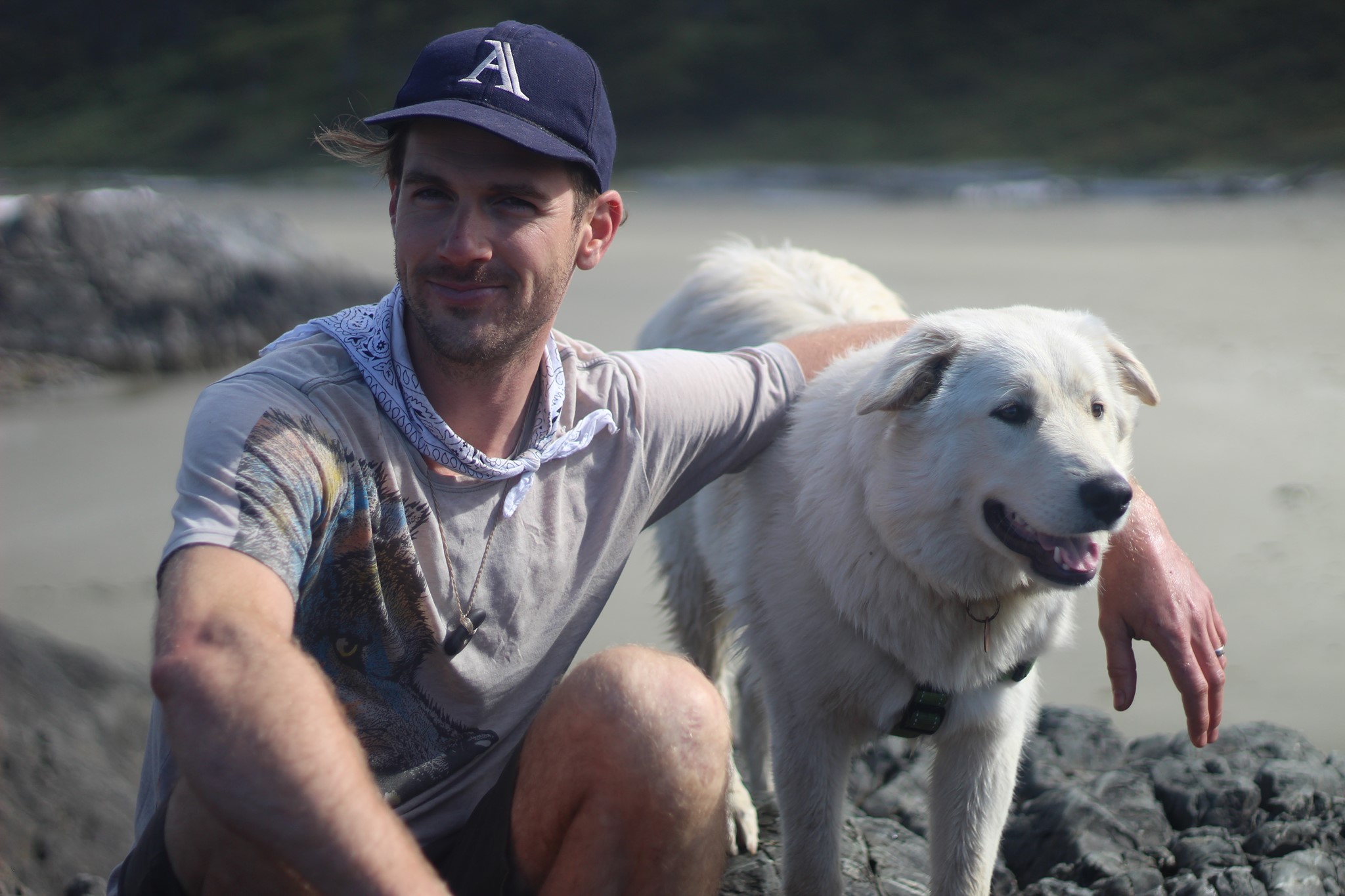 David Reize
David Reize
I grew up in a river valley west of Mohkinstsis, Calgary, Alberta. My integral values, and sense of self in large part took shape within the natural ecology of the Elbow River Valley; I honour my attraction and connection to the wild and open personalities of this land and its waters: the Willow, Poplar and Spruce; the Whitetail and Moose, Bear and Cougar; the Whitefish and Rainbow Trout; the Merganser, Raven and Canada Goose. I also honour my Swiss-Canadian Father, and Eastern Canadian mother, my dear siblings, and the Evangelical Christian traditions and faith of our family. I honour the model and mystery of Jesus of Galilee, wellspring of compassion, mercy and love. Literary and historical figures like Leo Tolstoy, Fyodor Dostoyevsky, Stanley Hauerwas, Mother Teresa, Desmond Tutu and Gandhi have illuminated the love and character of Christ to me. I also honour the Indigenous Elders and ceremonial communities that hosts a deepening of my spiritual connection to this land and to my own spirit. Emerging from these influences, an interaction of strong values draw out in me a bottomless curiosity and wonder towards the depth of our spiritual nature, and the unspoken reality of our sufferings. I strive to understand wounds and weakness in the light mystery of our true nature, one which is not separate from the very Nature of the Cosmos, which Creator sets into movement and interaction. The MPS degree at St. Stephen's has been a natural outworking, exploration and development of these values, which carry me now into psychotherapeutic practice and research frontiers. A key aspect of this program that informs and outlines my future directions of practice and research has been the completion of my thesis research project into relational movements of the self in connection to the Natural world, as previewed below. I am excited to bring these foundations into a growing practice within the field of social care, working with vulnerable populations. At present I am practicing within a wilderness-based experiential treatment program for young men with addictions, which dovetails beautifully with the core interests and approaches of my developing practice. I hope to continue working in contexts like these, and concurrently to contribute to a growing body of research in nature-based and ecological therapies.
Thesis Title: Relationality, Reciprocity and the Nature of Self: Encountering Expansive Connectedness in the Natural World
Thesis Abstract: By moving within and between frameworks of relationality and personal knowing, this exploration seeks to grapple with the meanings and connections between home, the natural world, and an expansive and related sense of self. Beyond the construal of self as a definite and individuated entity, my premise is an expanded sense of self, taken more as a context of relational movements than as a static noun, upon which predicates can be attributed; The balanced, dialectical, ever-moving ever-relating quality of Nature is explored as a viewpoint through which this sense of self may accrue depth and dynamic. From this basis I explore the relationship between themes of belonging and autonomy within home, in Nature and the cosmos, viewing these in relation to longings, motivations and coping strategies that accompany and underlie substance use and addictions, that inevitably result in narrowed and sequestered experiences of a self. My role as a therapist and participatory observer among the young men of Shunda Creek, a 90-day mindfulness-oriented wilderness addictions program in the Canadian Rockies, offers a wealth of rich and engaging descriptions, generating important dialectic resonance with my own knowings and discoveries. The heuristic approach and participatory stance that I employ in this study is complimented by these experiences as well as selected material of data collected within this program.
Favourite SSC Memory: My highlight experiences of St. Stephen's have been in classes that hold space for a personal and spiritual connection with both the subject matter, and others present. My fellow students have characteristically shown a courage and openness in moving into this kind of sacred space together, which has been deeply inspiring. In particular, a class on Expressive Nature Therapies, hosted beautifully by Dr. Madeline Rugh, stands out to me, as our intentionally slowed student engagement with the natural beings around us set the tone for caring, respect and wonder within the classroom interactions. This class paved the way for the research interests of my thesis, and with Dr. Madeline Rugh as its supervisor, my research exploration unfolded with the same temperature of respect, honour and reciprocity. I am deeply grateful for these experiences.
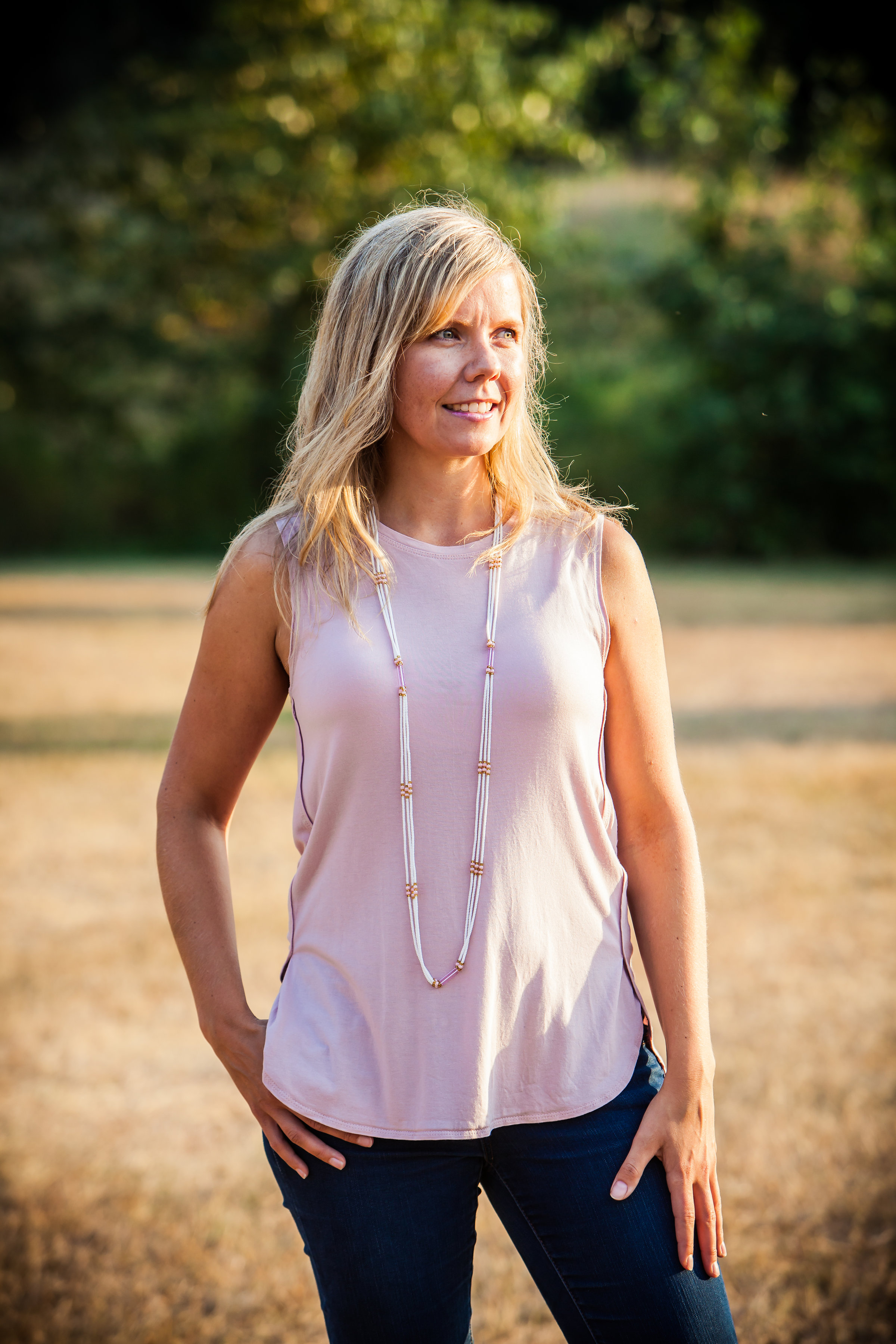 Megan Shandro
Megan Shandro
Having worked in the social sector for the past two decades, I have developed an appreciation for the depth and resilience of the human spirit. As a person of great faith, I have been influenced by various spiritual practices and teachings. It has been a great privilege to have been able to further my education in the field of psychotherapy and spirituality The MPS program at St. Stephen’s College has allowed me to consider spirituality as part of my vocation.
Capstone Title: A.C.O.R.N. PROJECT: A Project Supporting Children Navigating Ambiguous Childhood Loss & Disenfranchised Grief
Capstone Abstract: The A.C.O.R.N. Project focuses on the topic of ambiguous childhood loss and disenfranchised grief. More specifically, grief related to the ambiguous loss or separation of a parent or primary caregiver as a result of family separation, parental illness, addiction, incarceration, child welfare involvement or other types of ambiguous loss. The project provides a rationale and highlights the gaps in the literature surrounding ambiguous loss and supports for children and their families. As a result, the research incorporates best practices for working with children, integrating constructivist theory, attachment theory, general grief theory and hope theory. Taking into account developmental stages, cultural sensitivities and ethical principles, this project sets a framework for interaction with children and families in a group setting. An eight-session program for children and their families is outlined, including specific therapeutic interventions, goals and guidelines. The project reflects best practices for working with children by integrating Narrative Therapy and Art-based therapy. This project is based upon academic research and informed by both my own personal and professional experiences, having worked with children and families over the past two decades.
Favourite SSC Memory: Many favorite memories include connecting with my peers and getting to know their stories over the five years I spent completing my program. I will carry with me many fond memories from my time on campus. Having grown up in rural Alberta, making the trip to Edmonton to attend courses always felt like I was returning to my roots. Being on the U of A campus again brought about many full circle moments, as I graduated with a BSc in Human Ecology from U of A in 2005.
Future Ambitions: I plan to continue my work as counsellor, working with children, families and individuals in the small community in which I live. My current approach is rooted in Narrative Therapy, however, I hope to pursue additional training in various body-centered psychotherapy modalities. I intend to register with the BCACC as a Registered Clinical Counsellor and have the option of opening my own private practice in the future. In the meantime, I strive to find balance between my work, family life and free time.
Master of Psychotherapy and Spirituality (art therapy specialization)
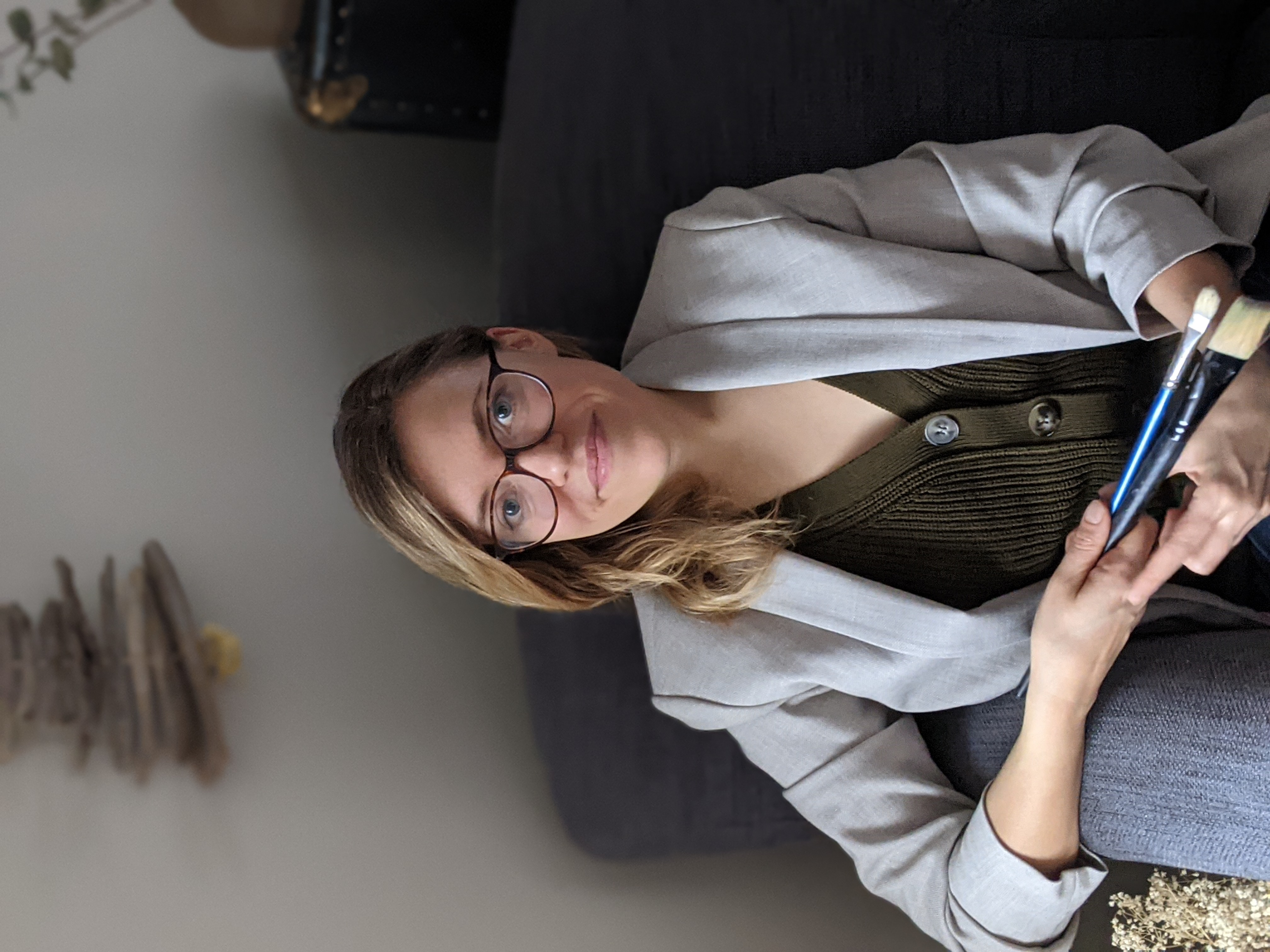 Katrina Grabner
Katrina Grabner
I live and work on the unceded territory of the Coast Salish peoples, including the Musqueam, Squamish and Tsleil Waututh Nations, also known as Vancouver, BC. I work as a trauma therapist with Family Services of Greater Vancouver supporting children, families and people of all marginalized genders, including women, Two Spirit, trans, and non-binary people, who have experienced violence and abuse. I also work one day a week in private practice where I run online art therapy groups and workshops.www.cultivatearttherapy.com
Capstone Title: Arise: An Art Therapy Group Manual for Women/Persons With Vulvas and Vaginas Experiencing Dyspareunia (Chronic Sexual Pain)
Capstone Abstract: 15% of women in North America experience dyspareunia, chronic sexual pain (American Psychiatric Association, 2013). Women who live with dyspareunia find it difficult to seek help, treatment, or support, and report a complicated path to diagnosis (Pukall et al., 2016). Dyspareunia impacts women/persons with vulvas and vaginas on an emotional, physical and spiritual level, causing increased anxiety, guilt, disembodiment, isolation and relationship distress (Ayling & Ussher, 2008; Donaldson & Meana, 2010; Johnson et al., 2015; Kaler, 2006). With so many people impacted by chronic sexual pain, it is essential that therapists have the knowledge and tools to support these clients. Art therapy is particularly suited to enabling client engagement in which physical, emotional, cognitive and spiritual aspects inherently come together to promote embodiment and meaning making. In response to this need, I have created Arise, a comprehensive manual for leading a 12-week, closed art therapy group for 6 to 10 women/persons with vulvas and vaginas living with chronic (at least 6 months) self-identified or diagnosed dyspareunia.This manual presents twelve detailed sample sessions grounded in an ecofeminist approach to art therapy, and has been created for professional art therapists and psychotherapists with art therapy training. Arise is designed to create community, normalize experiences, share resources, promote social change, nurture embodiment, process emotion, expand identity and honour individual yet interdependent journeys through the creative process. I provide my personal reflections in an integrative paper in which I reflect on my spiritual and theoretical approach, my professional identity, and my art therapy learning journey.
Favourite SSC Memory: In Intro to Art Therapy with Ara Parker we created a group mural together on the last day and hung it up in the basement hallway. For years to come I loved walking down the St. Stephens stairs and seeing such a vibrant example of community and play!
Future Ambitions: To continue growing as a trauma therapist and as an art therapist. I recently completed trauma training with Janina Fisher and I will begin Somatic Experiencing training this month. This spring I received a grant to put my capstone project into action and next month I will run my first online Arise group.
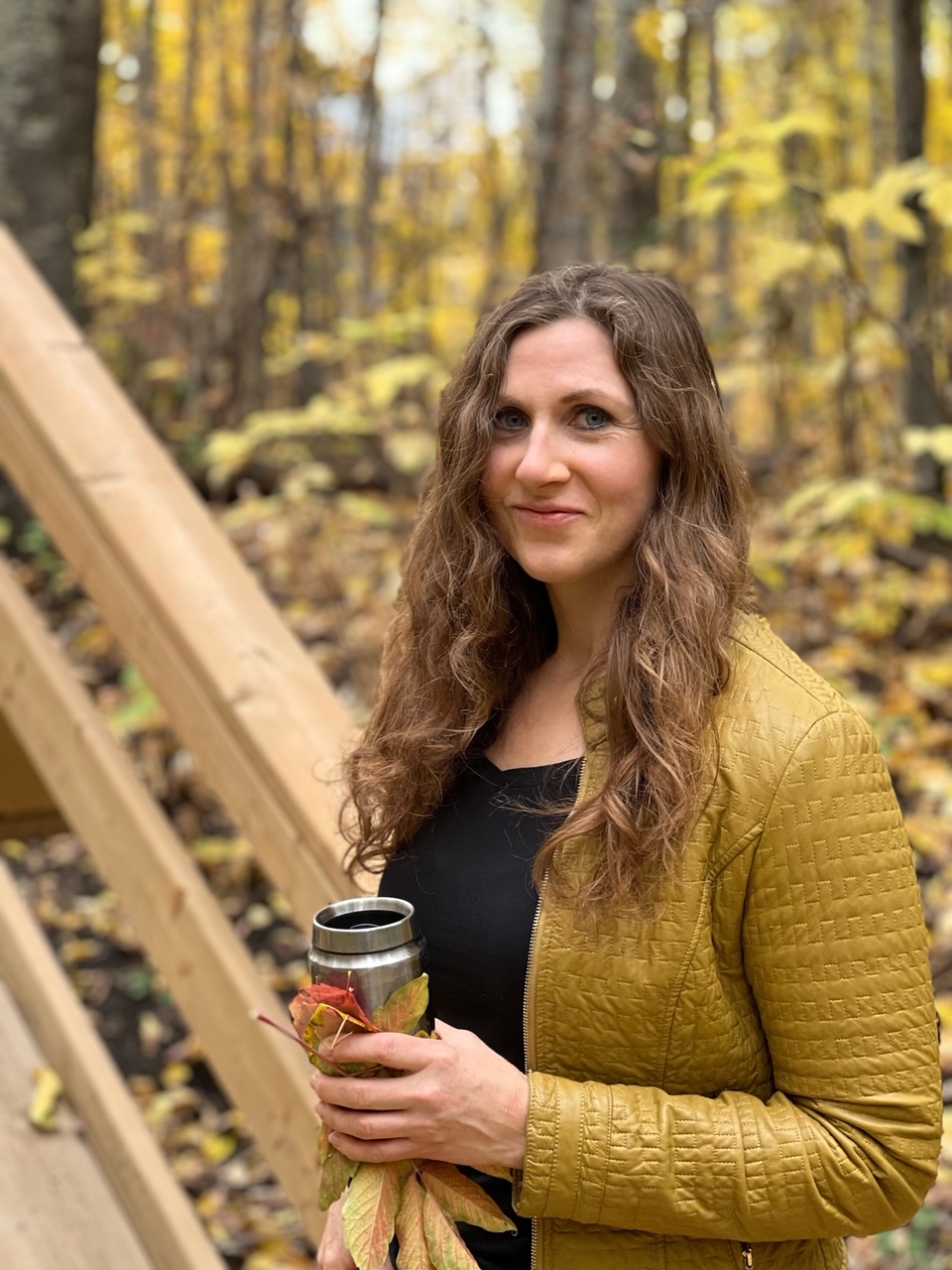 Tianna Mapstone
Tianna Mapstone
I am located in Treaty 6 territory of Edmonton, Alberta, Amiskwacîwâskahikan. I have spent the majority of my career thus far working in the child protection field supporting families and children. I am particularly interested in the impact of trauma on development, identity, and attachment relationships, as well as facilitating healing using both art and somatic interventions. I’m also interested in existential and narrative perspectives and in the ways Art Therapy can be used to support healing from trauma and the re-development of identity after individuals have experienced trauma or abuse.
Capstone Title: Building Bridges and Growing Wings: An Art Psychotherapy Group for Women who have Experienced Intimate Partner Violence
Capstone Abstract: Intimate partner Violence (IPV) is a pervasive social problem, which despite impacting all demographics and socio-economic strata, remains overwhelmingly a gendered issue, predominantly victimizing women and perpetrated by men. And while there is significant research devoted to supporting women to leave abusive relationships, the full process of healing from intimate partner violence (IPV) is often glossed over in academic literature. Social service agencies frequently consider women who have been abused to be healed once they have successfully escaped the abuse. However, the effects of IPV can be insidious and long lasting, impacting health, altering identity, decision-making, parenting capacity, and how individuals navigate their lives. This paper explores identity as an integral part of the healing process by examining literature on the experience and shift from victim to survivor identities and their roles in healing from abuse. This paper will then discuss the cultivation of an identity that is less tied to abuse--an identity of thriving--and its subsequent benefits for wellbeing. Using an eclectic approach, integrating IPV research with concepts from art therapy, attachment theory, trauma-informed practice, feminist psychology, existential psychology, and narrative therapy, this project culminates in a comprehensive group art therapy program manual to support women who have experienced abuse to re-author their identities and improve wellness. The goal of this group is to fill in a gap in professional services by interweaving traditional psycho-education and support for this population with art therapy experiences that deepen the process of identity recovery and re-creation. Included is a discussion regarding next steps for this work, including expanding this intervention to other gender populations who have experienced IPV. The final part of this paper will be an exploration and reflection of the learning experience and capstone process at St. Stephen’s College.
Favourite SSC Memory: Many times in the classroom and art studio a safe learning space was created for creative exploration and it enriched the depth of both personal process and academic learning.
Future Ambitions: My hope is to begin private practice work, but also continue to work with underserved populations in some capacity. I intend to increase my knowledge and capacity in trauma-informed therapy interventions, looking towards EMDR, and Hakomi training in the future. My hope is to be able to run the group that I designed for my Capstone, supporting women and others to heal from intimate partner violence and develop new and more whole identities after abuse.
Master of Theological Studies (Spirituality Specialization)
 Stephen Inglis
Stephen Inglis
Stephen’s academic pursuits are as eclectic as they are practical. Knowledge is never just for the sake of itself in isolation, but to be directed into action in the world. Travel, trades, Yoga, martial arts, philosophy and theology have all been aimed at the self and through the self to kinship or communion with others. This may unfold in many ways, sometimes through conflict, but in the best case it flowers into connection with community in the most expansive and inclusive sense. Stephen’s professional life has been rather broad, seeking and gathering diversity as the order of service. As a result, human service to those most marginalized and vulnerable is the professional milieu where he has found himself most at home over the last many years. If he had a single profession or academic identity it would be as an adventurer, and sometimes as a guide.
Thesis Title: Union and Communion: A Heuristic Inquiry into the Practice of Presence and the Experience of the Holy
Thesis Abstract: This thesis explored how the practice of presence has impacted the experience of the Holy. As a heuristic process, the scope of the research was limited to the person of the researcher. This included all aspects of life for the researcher as all dimensions of human experience are available to different degrees of presence, just as the Holy may be revealed through any dimension of experience. The primary method of practicing presence took place through the practice of Yoga. The traditional Yoga practice of eight limbs was focused through a heuristic research method involving six stages, which brought familiar academic form to the process and structured the exposition of the findings. Practicing presence was significant in the recognition of personal barriers and transforming the vision of the practitioner. Presence was required to discern between what was transient and personal from what was enduring and transpersonal. This exploration revealed a deep relational nature to the experience of the Holy. Difference, separation, otherness, and the idea of the wholly other as a conception of the Holy emerged as the dimensional fields for relationship. Relationship in all dimensions of being—physical, psychological, emotional, social, political, and spiritual—bridge the separation between our lived experience in nature and the dimensions of deeper ontological meaning. The specific content of the experience of the Holy remains nevertheless illusive, as it may be manifest only to understanding through the transient terms of human experience. We remain only singular participants in the relationship with what transcends our limitations or separations.
Favourite SSC Memory: Nervously smoking cigarettes with Norbert on the steps of the college at the MTS intake collegium, awaiting interviews with apprehension, having no idea where they would lead. They led to sunny lunches in the lounge with fellow students sharing ideas in the noon pause of intensive week-long courses.
Future Ambitions: To keep finding ways to continue learning and growing while cultivating an open mind and a light heart.
BACHELOR OF THEOLOGICAL STUDIES IN DIACONAL MINISTRY
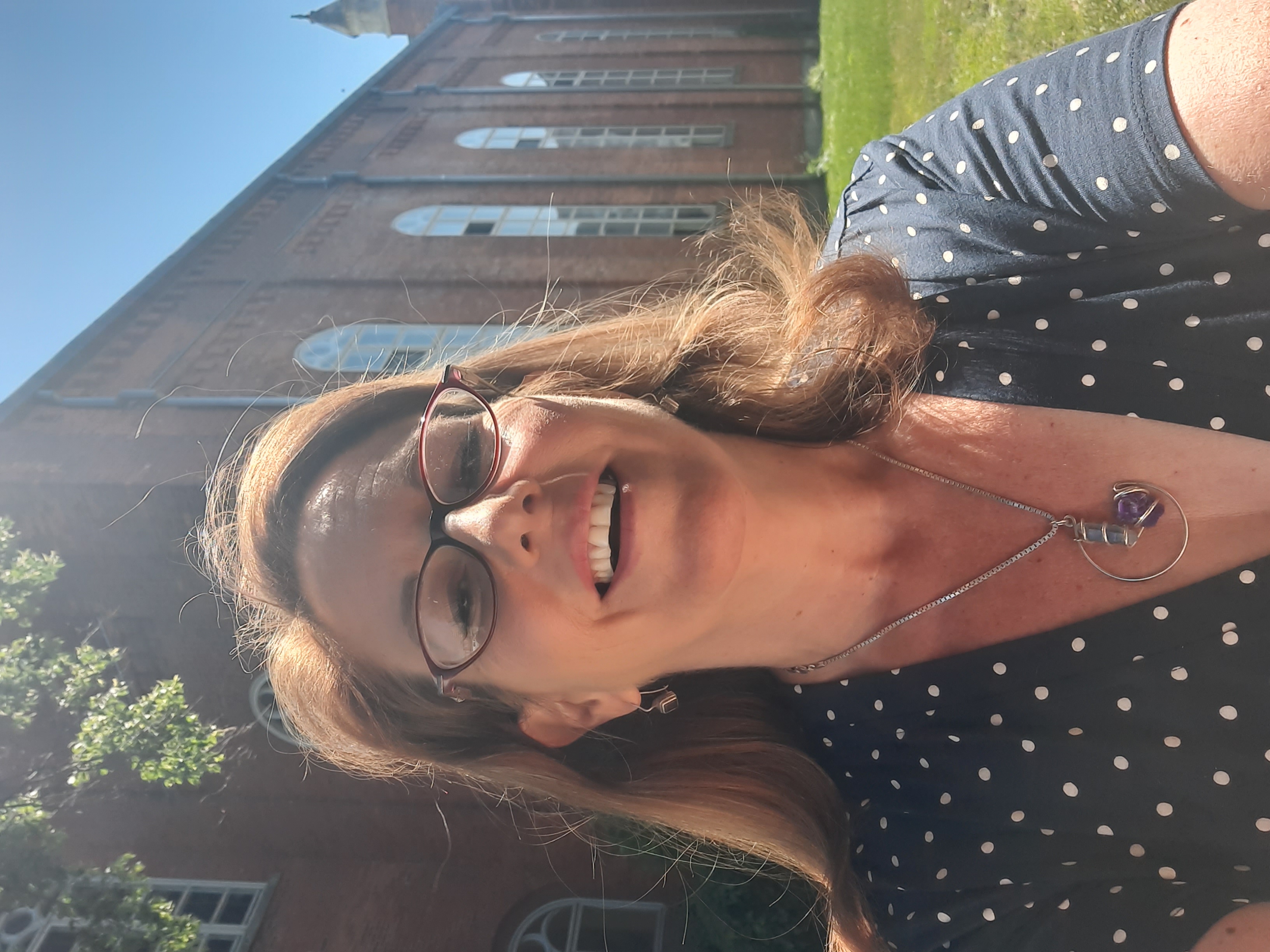 Karen Orlandi
Karen Orlandi
Rev. Karen Orlandi is a recently commissioned diaconal minister in the United Church of Canada, whose work is primarily focused on outreach to a community some may see in crisis. As a recovering addict, she sees recovery of all sorts as the real hope for the entire community. She is active in advocacy work for those in addiction, suffering from mental illness and living on the streets. With a background in marketing, engineering and music, she brings an unconventional approach to social change. She has just completed her Bachelor of Theological Studies and is currently enrolled in the M.A. Social Justice and Equity Studies program at Brock University, is employed full-time as a minister at Silver Spire United Church and shares her home with a ridiculously large Dane/Mastiff cross named Reggie.
Integrative Theology Paper Title: The Diversity of Jesus' Community Realized Through New Urbanism
Favourite SSC Memory: I think one of my favorite memories was lambasting Hosea to the tune of “How do you solve a problem like Maria?” substituting Hosea for Maria. The classes where we were able to come to Edmonton and learn from such a wise scholar such as Dawn Waring was quite spectacular. She turned me on to Renita Weems, and theology changed for me.
Future Ambitions: I am entering into graduate work in Social Justice and hope to continue to advocate for those on the margins from within the church. There must be a balance between kindness and justice, and I hope to move us along the arc towards equity and justice for all.
Graduate Certificate in Spiritually-Informed Psychotherapy

Corinna Centeno
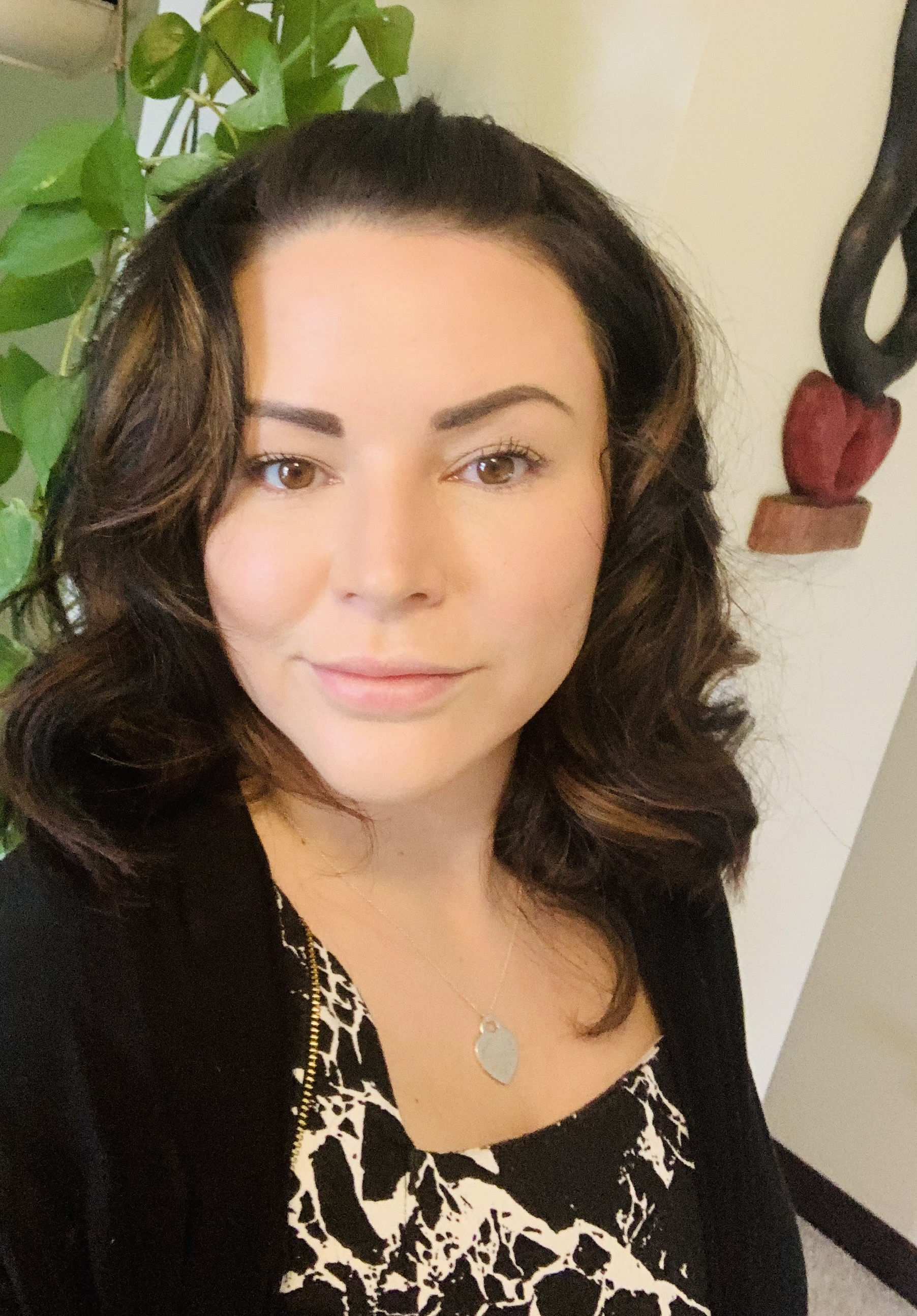 Danielle Fiddler
Danielle Fiddler
Throughout the last 11 years, both academically and professionally, I have shown great dedication to serving those in vulnerable populations ie. high risk youth, children whom have suffered the horrific trauma of sexual abuse, individuals who have been sex trafficked, and adults whom suffer from substance abuse disorders and concurrent mental health concerns. I have done so in a variety of capacities including Frontline Worker, Supervisor, and Counsellor. I have used my voice to be a strong advocate for the marginalized, used my knowledge to help educate individuals to make decisions for themselves, and used my kindness and compassion to offer a safe place in which individuals in struggle can feel heard, validated, and experience unconditional positive regard in a way that fosters growth/change within themselves.
Favourite SSC memory: My favorite memory of St. Stephen’s was when I was told that the school would be “educating the whole person”.
Future Ambitions: I have obtained a Diploma in Early Childhood Development, a Degree in Psychology, and have now completed a Graduate Certificate in Spiritually-Informed Psychotherapy. My goal is to continue with my studies. For example, to graduate from a Master’s Program so I can continue to foster my own education and enhance the lives of the vulnerable individuals I serve daily. With future education in mind, I believe that I will be able to better serve the clients I am already serving. For example, I am currently counselling individuals with complex trauma, those that are in crisis from being human trafficked, and men who have substance abuse and concurrent mental health concerns-- I would like to continue fostering my education in these areas.
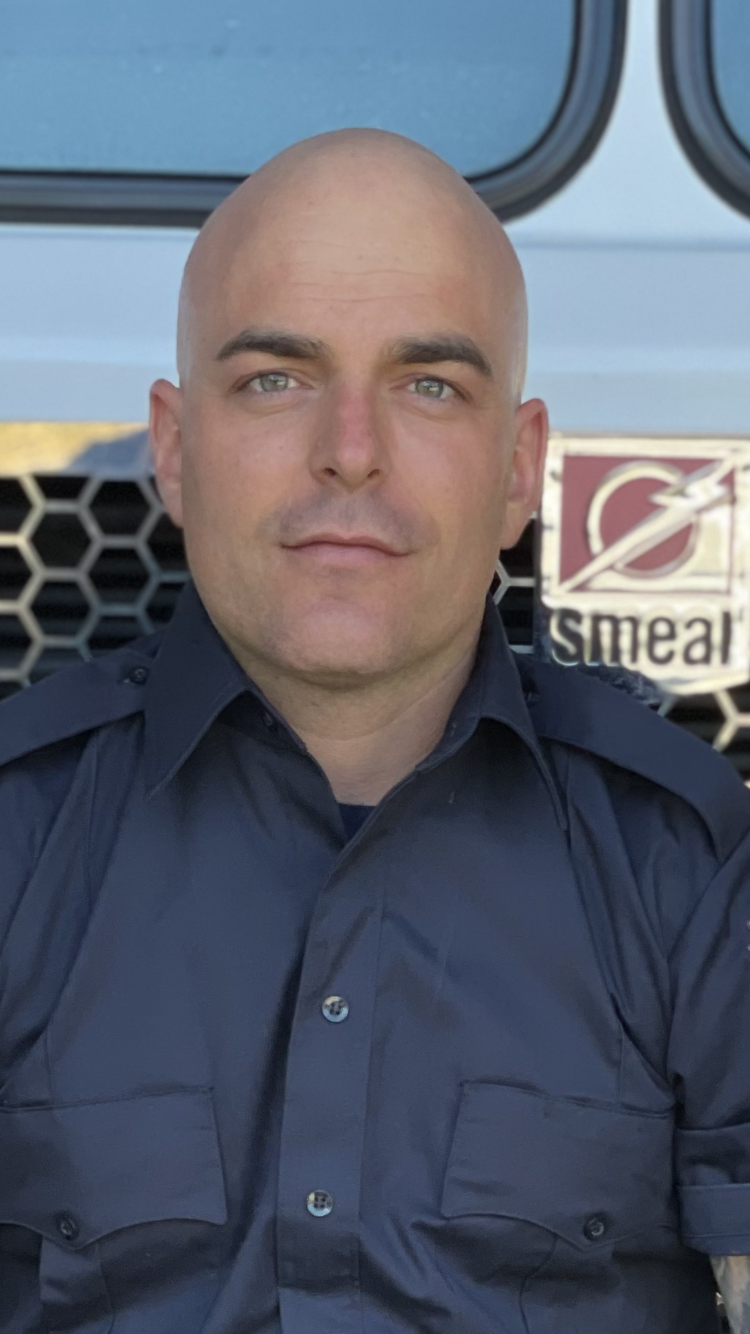
Willis Kuechler
Chandra Mannix
Carey Mastre

Rebecca Smith-Mandin
 Dale Yardy
Dale Yardy
I am an ordained minister having lived in both Australia and Canada over the past twenty years, working in congregational ministry. I am currently working as a Uniting Church Chaplain in Aged Care in the Hunter region of NSW, Australia. I have the distinct honour in this role to journey alongside staff, residents and their families offering spiritual care to a wide variety of people from many different faith backgrounds and traditions.
Favourite SSC memory: Walking the labyrinth during breaks, braving the winter snow with classmates for coffee, Oilers games, and in-person lectures.
Future ambitions: To continue my studies in the field of Psychotherapy and Spirituality at SSC and to deepen my work in this area.
Graduate Certificate in Spiritually-Informed Creative Arts
 Diana Cline
Diana Cline
Fine Arts Certificate from Kootenay School of Art and Design, Bachelors of Fine Arts from NSCAD University, Certificate from St. Stephen’s for Spiritually-Informed Creative Art. During my time in Edmonton, I have been working at the Nina Haggerty Centre for the Arts facilitating artist classes in person and presently virtual. During my time at the Nina Haggerty, I have led a health and wellness workshop and show and a virtual meditation. I am a big believer in neurodiversity and identify with being dyslexic. I have also participated in 3 full marathons, using my last marathon to raise funds for the Nina. I believe in volunteering and creating community that everyone can participate in.
Favourite SSC Memory: I loved the space that was created in the studio classes, the ability to share and create, and talk about the process. Everyone was so respectful and unique - I really enjoyed listening to each person. The poetry, the lighting of the candle, and the pause for reflections.
Future Ambitions: Moving to Halifax N.S to peruse my artist practice and continue my education at NSCAD University and MFA. I would like to continue to facilitate artist classes and keep working towards creating space for inclusive communities.
 Martina Keast
Martina Keast
MTS, EXAT practitioner with World Art Organization, Author, Facilitator, Creative
Favourite SSC Memory: Introduction to Art Therapy, Saturday with Dr. Ara Parker, Art Therapy with Dr. Micheala Slipp, and Art and the Mystic with Dr. Markus Scott Alexander. Music Therapy classes with Sheila Killoran online were perfect.
Future Ambitions: DMin with Christian Leadership University currently 50% complete.

Carey Mastre
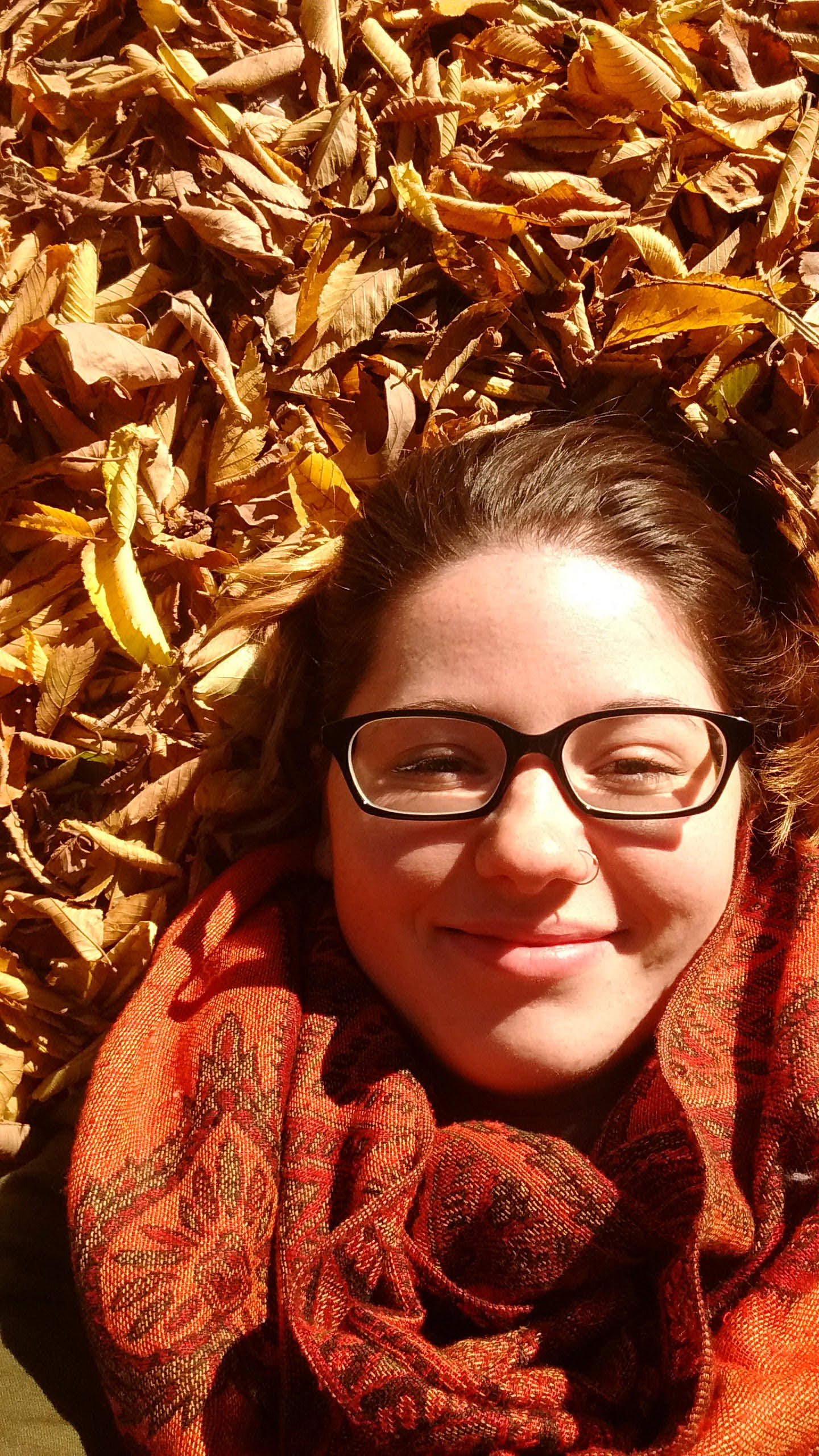 Raven Van Camp
Raven Van Camp
Graduating with a certificate in Spiritually-Informed Creative Arts.
Favorite SSC memory: Of the many things I loved about spending time at SSC, I particularly enjoyed the time spent with my peers in the Art Studio - the encouragement we received to include our spirituality in our writing and art was such a breath of fresh air. It gave me permission to be myself and let go of expectations for myself and others, to learn without any of the trappings that usually come along with the competitiveness of academia.
Future ambitions: Managing my health well enough to return to academia (hopefully at SSC!) and continuing to learn in whatever situation I find myself in.
GRADUATE CERTIFICATE IN THEOLOGICAL STUDIES
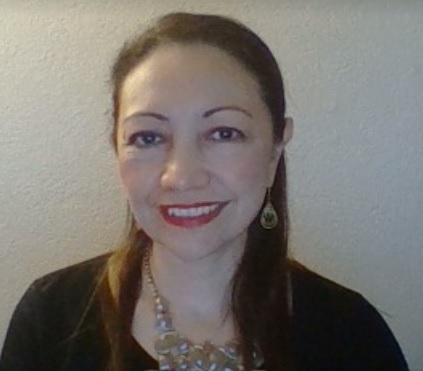 Claudia Garcia Martinez
Claudia Garcia Martinez
I am originally from Aguascalientes, Mexico, where I studied my Master's Degree in Education and where I have collaborated with several educational institutions as a teacher, course developer and teacher trainer in international competencies and new technologies. I had the opportunity to complete my doctoral studies in education at the University of Paris-Lodron in Salzburg, Austria. In cooperation with the governments of Germany, Taiwan, and Singapore, I started to participate in the project to train teachers in the European Framework's lifelong learning competencies. During my career, I have perceived that one of the educational opportunities to be covered is disseminating the benefits of education with a spiritual and social welfare sense. Based on the above, I designed the Integral Wellness system, applied in educational institutions and corporations. This, combined with a coaching system, has impacted the participants' personal and professional development. Currently, I am in charge of the multi-cultural and multi-faith department at the university. Therefore I have found the GCTS programme at St. Stephen's College to be a formidable guide to understanding other spiritual dimensions of the human being and thereby orienting students in their personal and spiritual development. My experience at St. Stephen's College has been extraordinary as I have been able to meet teachers of excellent academic and human quality, as well as classmates with whom I share ideas for a better world society.
Favorite SSC Memory: In all the classes, I found human warmth and openness to express our thoughts and experiences. Therefore, my memory is of having had a personal sanctuary for my learning and spiritual development.
Future Ambitions: My goal is to apply what I have learned with the university's multicultural centre students and members and continue studying to develop my spirituality further.